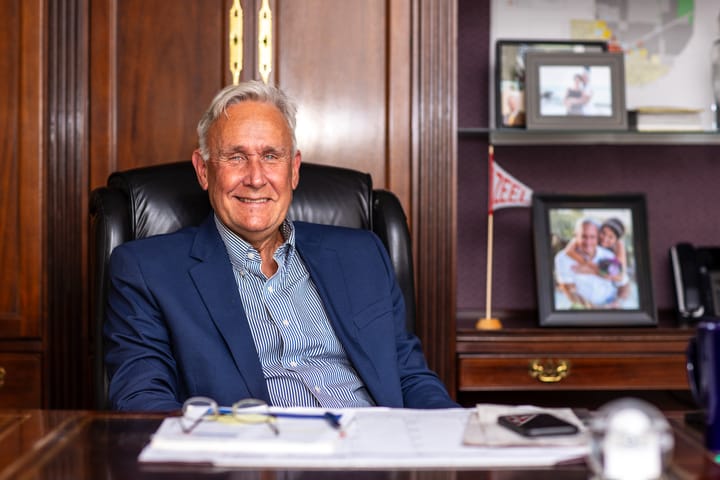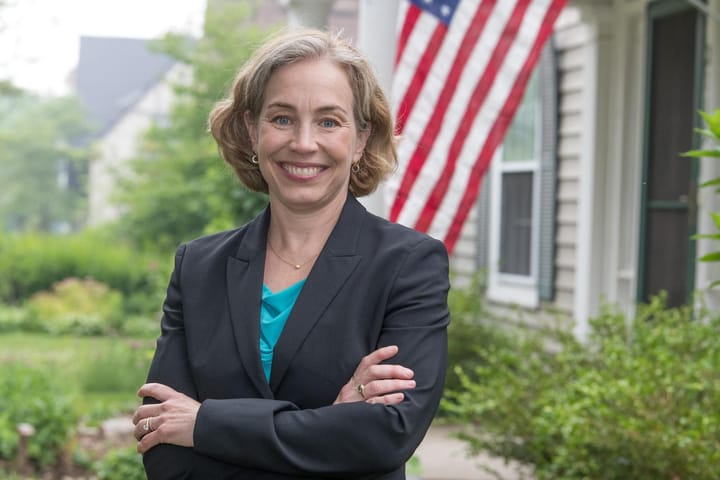Local organizers urge Ottawa County to see the rise of Christian Nationalism and to act
With OI and its supporters being vocal supporters of Trump and his policies, many local officials are encouraging community members to learn more about Christian Nationalism, how to identify it locally and, more importantly, what to do about it.
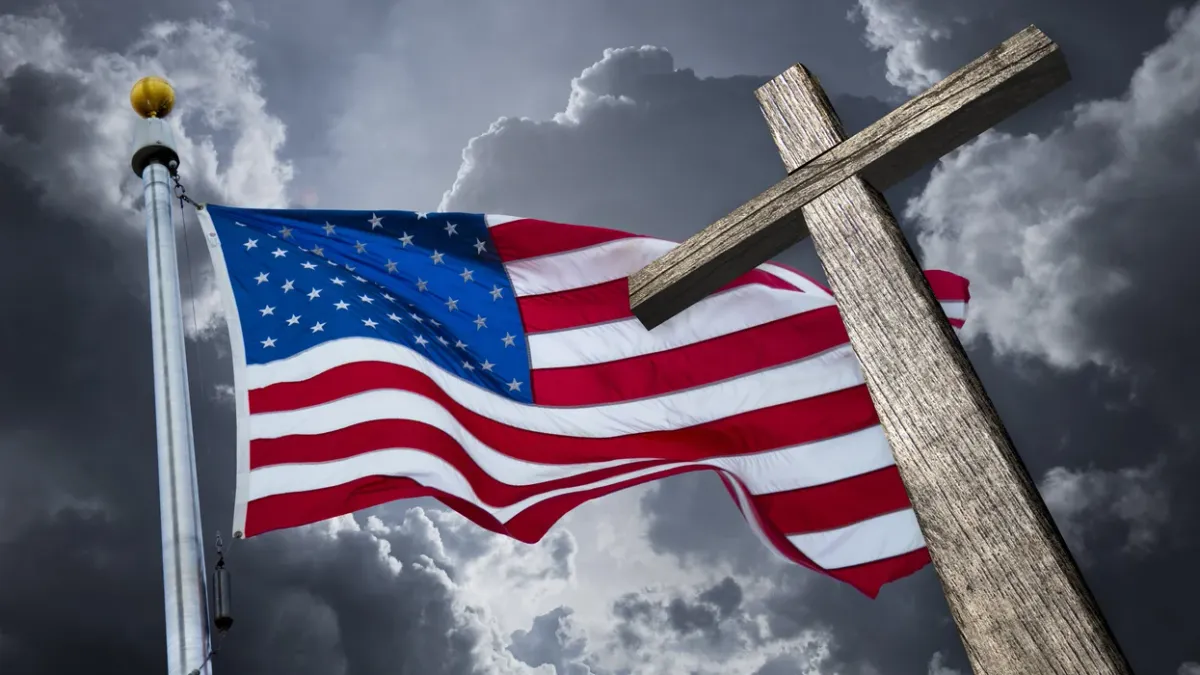
OTTAWA COUNTY — Ottawa County has gone through a political catharsis over the past several years.
It saw a surge in far-right sentiment in the form of fundamentalist group Ottawa Impact in 2022, borne from clashes over the county’s COVID-19 mitigation mandates in 2020. The group took a controlling majority of the county board of commissioners that saw numerous controversial decisions and seven lawsuits in 24 months. Those decisions inspired a countermovement that ousted the OI majority in 2024, however, some OI commissioners remain.
On the national stage, similar themes are emerging, with the re-election of President Donald J. Trump and the implementation of the controversial Project 2025, a hard-right playbook for American government and society.
With OI and its supporters being vocal supporters of Trump and his policies, along with continued statements that the United States was founded as a Christian nation, many local officials are encouraging community members to learn more about Christian Nationalism, how to identify it locally and, more importantly, what to do about it.
What is Christian nationalism?
Loosely defined, Christian nationalism is the development of politics and culture that reflect America as a Christian nation.
“It’s the idea that the United States was founded as a Christian nation and should be defended as such,” said Kristin Kobes Du Mez, an American historian, author and professor of history and gender studies at Calvin University. “It’s a modern manifestation of this mythical idea that God has a special plan for America — if it responds obediently.”
According to John D. Wilsey, an associate professor of church history at Southern Baptist Theological Seminary in Louisville, Kentucky, the concept of Christian nationalism has seen several manifestations throughout U.S. history, but modern-day nationalists share three common themes:
- They believe the American founders were Christians
- Theologically, they believe God has uniquely blessed America
- Philosophically, they believe they can interpret the intent of the founders much as one would interpret scripture
There are cases where Christian nationalism has been viewed, historically, as positive. Abraham Lincoln, for example, suffused his speeches with biblical language in support of preserving the Union. He interpreted the Civil War not as God’s vindication of the north over the south, but as God’s judgment on the nation as a whole for the sin of slavery.
Wilsey said this was an example of "good and righteous" Christian nationalism, "manifesting hope and flourishing through human freedom and equality under God.”
Wilsey, who writes extensively about Christian nationalism in his essay, “The Many Faces of Christian Nationalism,” said that, while some earlier conceptions of Christian nationalism were forward-looking, its modern iteration is more nostalgic, looking back to an imagined past and cherry-picking facts from history.
Du Mez said the avoidance of a full accounting of American history and a fixation by staunch conservative groups to target concepts such as Critical Race Theory in schools is actually part of a strategy to ensure their own political power.
Characteristics of Christian Nationalism:
- Religious exclusivity: Non-Christians or dissenting Christians are often marginalized.
- Faith-based legislation: Laws reflect Christian beliefs and are enforced upon the populace.
- Historical revisionism: The idea that a nation’s history and identity are rooted in Christianity.
- Use of symbols: Christian symbols and practices are found within government spaces.
“Christian nationalism has this myth that America is a good country, from its founding,” Du Mez told Pete Dominick this week on his “Stand Up with Pete Dominick” podcast. “And so when you get something like the 1619 Project that says, ‘Well, wait a minute here. Explain how a 'Christian' nation can decimate Native Americans, can enslave Black populations or African populations — explain again how that’s Christian?’
“That strikes at the heart of that primary identity that we are God’s chosen people and that this is our country,” du Mez said. “And so education disrupts that. History disrupts that — just plain old history. You don’t need CRT — nothing against CRT — but you don’t need it. All you have to do is read basic American history and it will mess with any myth of Christian America.”
Local residents mobilizing
Oliver Shampine, 22, has been politically active since 2018. The Grand Haven resident ran as a Democrat for the District 10 seat on the board of commissioners in 2022.
Although he didn’t win, “it's the impact you can make, just with your voice and maybe getting things moving forward.”
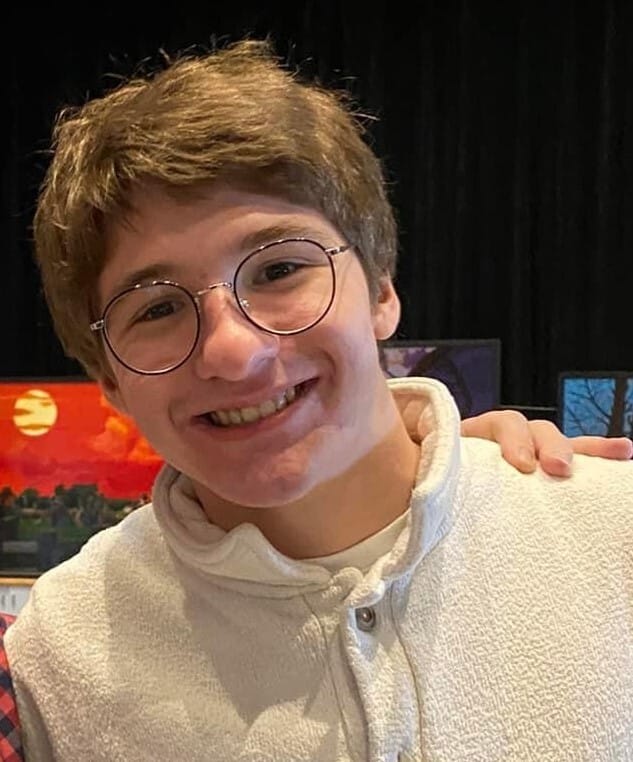
He said he is committed to helping his community, which includes educating residents on the political dynamics that are happening locally and nationally.
“I like this community a lot. I want it to flourish, but also be a place that does welcome all and to see both now on the national scale and clearly on the local scale, this threat of nationalism coinciding with Christianity, it scares me a little bit,” Shampine said. “And it's sad, because I think it takes away from the true spirit of being a human and being able to have different opinions and to be able to actually explore and express those freely.”
Shampine said Christian Nationalism has appeared in many notable periods of history.
“This is nothing new. From the Crusades to the Salem Witch trials to the Scopes Trial to the anti-moral majority movement, to today — getting the Ten Commandments back in schools, to movements against Sharia law, movements against LGBTQ-plus people — people are using the religion of Christianity to push those movements and to validate them,” Shampine said. “It's a really risky conflation to do, because I think it then starts to hurt other people's ability to explore and share their own opinions, especially religiously, with their freedoms.”
Shampine said it’s important for residents to remember that politics is infiltrating nearly every aspect of modern American life — to the point it’s no longer an option to ignore.
“I think politics are going to be important every single day, whether or not you're on the winning side,” he said. “If you just decide to give up or stay quiet, that's when you really let things just slide on by, and who knows, one day, maybe you won't be able to ever actually express yourself in those ways.”
“We're seeing, in my opinion, Christian Nationalism blow up and its ways of trying to express itself in our government. I didn't expect people to openly display as much right away, but right now, to see it in our face again and so unapologetically,” he said.
He said the storyline of Ottawa Impact in the county should be a direct example for local residents to recognize what is at stake.
“I believe that some of the members of Ottawa Impact are members, or at least sympathize with groups like this that want to bind both religion and politics together,” Shampine said. “And unfortunately, we've seen how that can turn out. It never seems to fully represent, though, what a lot of the Bible talks about, of compassion and love. Instead, they use it as a way to dehumanize others and cause divisiveness within our communities.”
Shampine recently organized a panel so local experts could share with the community how to understand the origins of Christian Nationalism and the potential consequences of allowing it to grow and flourish.
“I want people to walk away with at least a basic understanding of Christian Nationalism, its historical roots, as well as theoretical roots from religious thought, and to then be able to recognize it in public spaces and see it more openly for what it is,” Shampine said.
“How can we combat it? What should we do when we see it? Why is it a bad thing? Why or and how can we properly try to disengage people from said thought and be more reflective in the ways of seeing dignity at all and compassion for all?”
Shampine said the community has an obligation to “call out rhetoric that is divisive, challenge it and find better, new paths to build forward where we are open and understanding for all to get involved.”
“If it's going to continue to be showing up in this way, we should know what it is, so that we can recognize it and then appropriately react.”
Panelists explore Christian Nationalism
The event, which took place Feb. 4 in Grand Haven, featured panelists:
- Jared Cramer, pastor at St. John's Episcopal Church in Grand Haven, who also holds leadership roles in the Episcopal Diocese of Western Michigan. Cramer sued the county board of commissioners in 2023, alleging religious discrimination; the case was settled in late 2024 for $100,000.
- George Lundskow, Grand Valley, professor of sociology who specializes in social psychology and religion. Lundskow has published numerous articles and books on the social psychology of right-wing populism and American character.
- Wes McGee, CEO of IC/3 Group LLC, which spearheads executive searches for medical doctors for hospitals, clinics and universities in the U.S. McGee also has served on several local boards and commissions that serve human relations and cultural and ethnic issues.
- Mac Davis, professor emeritus of English at Ohio State University and the author of numerous works on psychoanalysis and cultural criticism.
Shampine kicked off the event with a brief history and description of Christian Nationalism.
“It's the belief that a nation should reflect the wills and law of the Bible,” he explained. “They often assert that America was founded as a Christian nation and should return to those roots. But it's not just merely that. It's also about restructuring our national identity and laws pertaining to their own interpretation of Christianity.”
Shampine said Christian Nationalists are “people in the highest levels of society who start to see what they perceive as a moral failure and decay that they’re upset with, so they start a movement.”
He referenced the Holy Roman Empire as a well-known example of how elitists want to “bring back their lost golden age.”
“The Holy Roman Empire sought to make it a great Christian empire, specifically using religion as their justification for their power over other people, over other nations, over other lands, and they ruled in God's name,” Shampine said. “So God gave them the power to take them. Later, Benito Mussolini used these exact same words, too. He needed to make Italy great again and restore that empire.”
He also pointed to the Crusades — a series of religious wars initiated, supported and sometimes directed by Western European Christians in the medieval period — as well as the Puritans who established the first U.S. colonies in the United States.
“While they were persecuted themselves, when they got to this land, they specifically also wanted it to be a Christian nation that followed their specific values,” he said. “It didn't matter who lived there before, the indigenous people were no longer needed there, because God had given us the right to these lands. And throughout history in America, it's been clear that Manifest Destiny is still something happening today. It's unfortunate because Christian Nationalism has done a lot of damage forever, and it's growing again in prevalence.”
He then correlated the parallels between historical examples and the current administration.
“I'm sorry this upsets some people, but Trump's ‘Make Great America Again’ follows those exact same patterns there,” Shampine said. “It uses nostalgia, it uses religious identity to push a nationalist agenda.”
McGee said Christian Nationalism is more than just theology.
“Christian Nationalism is about white power,” he said. “We have the enslavement of native people here in this land and in the islands and everything began to look at ‘How are we going to take over this world?’”
He pointed to the reconquest of Spain in 1492, known as the Reconquista, as another example Christian Nationalism.
“The problem comes in when nobody talks about what was going on in Europe at the time,” McGee explained. “Spain and Portugal were controlled by Africans and Arabs from North Africa. The reconquest of Spain led to Christians basically taking over everything. The foundation was set, and it is still going on now. It's based on control and based on black, white, brown and yellow, and who's going to be on top?”
He tied the same ideas and beliefs to what Ottawa County saw with the OI-led board from 2022 to 2025.
“When we look at this more closely, as we saw here locally with the county board of commissioners, things can change,” McGee said. “It's called white fear. Whites are scared today about change. We know it. You know it. Everybody knows it. Everybody in the world knows it.
“If you don't look at the fear that's taking place out here, we can't go that much longer anyway, because there's going to be some tragic things coming up.”
He said it’s imperative for residents to be aware and to be ready to work on solutions.
“Who is OI? Who's behind it?” McGee said. “Look at what is happening with yourself, people you know and get involved. We have to begin to look at organizing our community.”
Davis cautioned attendees to not underestimate the amount of power that fundamentalist religion has, particularly with current economic policy.
“We have to understand that we're beyond an inflection point,” Davis said. “We're at a point of fundamental crisis in which we are going to have to either defend our democracy and our way of life, or we're going to lose it.”

Davis said residents have an obligation to themselves and their communities, and that civic duty extends beyond the ballot box.
“Citizenship is not primarily rights, it's primarily responsibilities,” he said. “Being a citizen in this country is a wonderful thing if one acknowledges the responsibilities of it … not to just vote, but to inform oneself to take those votes.
“I think the ultimate responsibility of all of us is to defend the Constitution, that we have to defend democracy, that we have to do it by whatever means necessary,” he said.
Lundskow said people should not feel hopeless — that major historical events such as the Civil War are examples of positive change.
“We don't want to underestimate the influence of how powerful that was, that slaves suddenly became free after a great conflict that radically changed the country, and the South was simply not going to accept that,” he said.
Despite the Civil War being over for 160 years, it isn’t settled for those bitter over the North prevailing over the South.
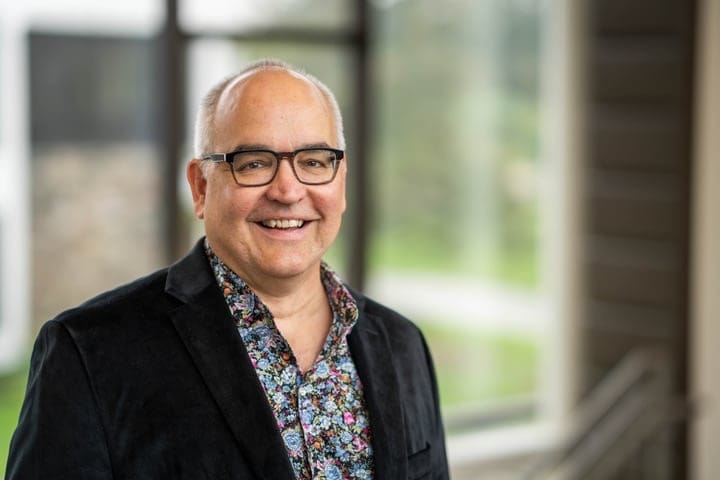
“As many ex-Confederates said, the war continues. … Unless we can completely remove every cultural vestige of slavery from southern culture, including this white supremacist identity, the war will continue, just in a different form,” Lundskow said. “Dominionism arose from that specifically and it's gone by different names and different social movements and different organizations over the years, but they all hearken back to that idea that the white race is superior and created by God to serve that superior role.”
Lundskow also pointed to red flags in Trump, saying his presidency is for personal gain.
“That's all it's ever about with him,” Lundskow said. “Trump’s National Security Advisor John Bolton said many times that Donald Trump simply cannot understand doing anything that in any way benefits anyone other than himself. He is emotionally and intellectually incapable of it, and he can't concentrate on anything for more than three or four minutes at a time.
“Nevertheless, whether his gain is entirely personal or monetary enrichment or whether it's an organization with racial motivations or gender supremacy, they will sprinkle in religious references and mention God and praise the Lord,” he said. “For some people, it's a coherent ideology that it needs to be a Christian-dominated nation. For others, it's simply a convenient kind of trope to mention when pursuing other gains. Arguably, especially with this administration, it's a big grift from beginning to end.”
Cramer said he is alarmed by implications of Christian Nationalists, who call themselves “true Americans.”
“There's true Americans, and then there's enemies of true Americans. So you're either one category or you're the other,” he said. “You're either with us or you're dead, or at least expelled from the country or imprisoned. … You're not just different or something — you're an enemy that has to be persecuted and prosecuted.”
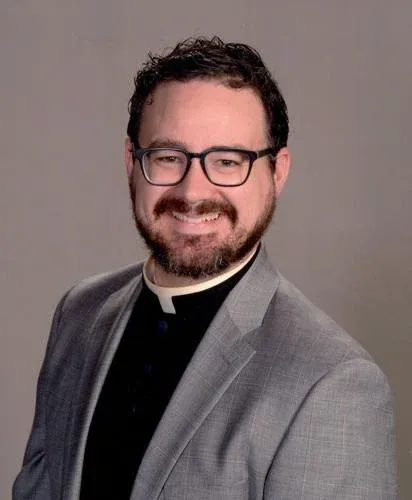
Cramer said he has been disappointed by the lethargic response of most organized religious groups to recognize the rising prevalence of Christian Nationalism.
A 2023 Christian Nationalism Survey, conducted by the Public Religion Research Institute in partnership with the Brookings Institution found that while only 3 in 10 Americans agreed that “God intended America to be a new promised land where European Christians could create a society that could be an example to the rest of the world,” majorities of Republicans (52%) and white evangelical Protestants (56%) affirmed it.
“I'm really struck by the theological frameworks that have supported it, because that's what makes me saddest. As a follower of Christ, one of the biggest ones, of course, is the idea of Manifest Destiny,” Cramer said of the belief that it was Americans’ duty to settle the continent, conquer and prosper.
“The church emphatically blessed the genocidal acts of our forebears. My own church officially repudiated and repented not that long ago, but it took way too long to do that, and that's connected to all of this,” he said.
Cramer said despite the absurdity of some aspects of Trump and his administration, the American people shouldn’t discount the harm he and his policies could render.
How to get involved
Visit:
- Christians Against Christian Nationalism is a grassroots campaign that provides materials and guidance on how to host community meetings. It also provides a toolkit for communities and states where there is an effort to install chaplains in public schools.
- Americans United for Separation of Church and State is an organization dedicated to the separation of church and state. They offer suggestions on how to learn more and get involved.
Read:
- The book “How to End Christian Nationalism” by Amanda Tyler helps explain to readers how to identify Christian nationalism, how it differs from the teachings of Jesus and how to have conversations with loved ones on the topic. The book is endorsed by Kristin Kobes du Mez, an author and professor at Calvin University who is considered an expert on Christian Nationalism.
- Du Mez wrote “Jesus and John Wayne: How White Evangelicals Corrupted a Faith and Fractured a Nation,” which made The New York Times bestsellers list in 2020.
- The book “The Founding Myth: Why Christian Nationalism Is Un-American” by Andrew L. Seidel explores the question of whether the United States was founded on Judeo-Christian principles.
Watch:
- Du Mez also produced the short documentary film “For Our Daughters” in 2024, which delves into what Du Mez describes as “the brave sexual and spiritual abuse survivors within the church who have shared their stories, and those who have not yet spoken.”
- “The Growing Threat of Christian Nationalism” part of the “Exploring Hate” series of video panels produced by PBS. Panelists include investigative reporter Katherine Stewart, author of The Power Worshippers: Inside the Dangerous Rise of Religious Nationalism; Eric K. Ward, executive vice president at Race Forward; and Guthrie Graves-Fitzsimmons, communications director at Baptist Joint Committee for Religious Liberty (BJC) and a member of BJC’s Christians Against Christian Nationalism. The panel discusses the rise of Christian Nationalism, its intersection with antisemitism, racism, and extremism, and why we should be paying attention.
“Trump wants to be kind of the next Andrew Jackson. He wanted to take Greenland and everything. And it's really easy to make fun of that, but there's some deep undertones behind that that are deeply concerning,” Cramer said. “He wants to do that because Andrew Jackson got the Louisiana Purchase. Andrew Jackson succeeded with the Indian Displacement Act in taking huge swaths of territory for real Americans. So that's what he's trying to do with these kind of ridiculous ideas that — and we make fun of him at our own peril — because this stuff resonates with a significant portion of our country.”
Cramer pointed to the continuing efforts by conservatives to dismantle public education.
“It's not really about religion,” he said. “It's about race. It's about power. And the last thing I'd say that makes me the saddest is the way in which the sickness of all of this even co-ops people of color, and that's what I think is the most disturbing,” citing the high turnout amongst Latino Christians for Trump in 2024.
He said what’s frustrating for him is that most Christian Nationalists don’t actually attend church services regularly.
“The vast majority of Christian Nationalists … these are people who don't really go to church,” he said. “They put on the identity and they like it and they trot it out, but they don't attend church regularly. In general, compared to other Christians, the more you attend church, the less likely are you to have all of this. So the religious frameworks have been put there in really kind of obscene ways. And the church has utterly failed to critique as much as it needs to.”
Cramer said Democrats also are accountable for the current political climate, saying they don’t provide a strong counterpoint to the rise of Christian Nationalism.
“You have to stop telling me the Democrats care about me,” he said. “They lie to me to get my votes, and when they have power, they immediately capitulate. The last time the Democratic Party had power, strong power, we could have fundamentally altered the fabric of our society, the positive direction. And what did we do? We passed a Republican idea about health insurance. And then we got beat up for it,” he said referencing the passing of the Affordable Care Act in 2010.
“I think this is part of the problem,” Cramer said. “Disillusionment is real, and until people feel like you actually care about them, they're not going to do anything.”
He said all Christians have an obligation to speak up and challenge the rhetoric that conservative officials assert.
Support Our Work
Ottawa News Network is a nonprofit news service dedicated to providing the residents of Ottawa County with trustworthy, community-driven news. ONN treats journalism as a public good — something that enriches lives and empowers Ottawa County’s 300,000-plus residents to stay engaged, make informed decisions, and strengthen local democracy. Please consider giving today.
“If Christians don't speak up, then that is on us,” Cramer said. “Christians need to offer an alternative voice in the media. That's what I clearly am trying hard to do — sometimes I feel like a voice crying in the wilderness — provide an alternative voice in the media, and the media needs to hold that accountable.”
For its part, Cramer said media needs to “be brave” and to not hold too closely to the idea of “giving equal time to both sides when one side is just fundamentally false.”
“It's not even about conservative or liberal, it's about false and truth,” Cramer said. “I think that the media needs to understand that sometimes good reporting is not about presenting an article that both people can read and think, ‘Oh, well, that could be OK,’ because sometimes it's that bad that you can't write that article. Courageous media is willing to say, ‘Hey, I might get pilloried a little.’”
— Sarah Leach is the executive editor of the Ottawa News Network. Contact her at sleach@ottawanewsnetwork.org. Follow her on Twitter @ONNLeach.


